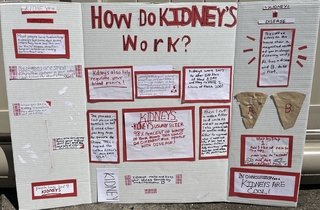Glomerular Disease: Aviva’s Story
Glomerular Disease: Aviva’s Story

When Aviva decided to enter her northern New Jersey town’s science fair, she selected a topic she knows a lot about: How Kidneys Work.
Aviva, 10, became an expert when she was diagnosed a year ago with IgA nephropathy, a rare type of kidney disease. She learned from her pediatric nephrologist at Children’s Hospital of Philadelphia (CHOP), Amy Kogon, MD, MPH, how IgA nephropathy interrupts normal kidney function and how the medications Aviva takes work to stop the disease from progressing.
“The science fair was a way to share what happened to me in a positive way,” Aviva says.
Steps to the right diagnosis
Last fall, Aviva told her parents, Nora and Jacob, her urine was brownish. “I felt completely normal, but my urine was the color of cola, and that wasn’t normal,” Aviva says. Doctors close to home blamed the discoloration on a cyst in her kidney, which they wanted to remove. Hoping to avoid surgery, her parents brought Aviva to CHOP’s Division of Nephrology for a second opinion.
Even though Aviva didn’t have some of the typical symptoms (such as high blood pressure and swelling of feet and ankles), the brown urine and her urine test results led Dr. Kogon to immediately suspect IgA nephropathy. A kidney biopsy confirmed the diagnosis.
IgA nephropathy is a condition that affects the glomeruli, tiny blood vessels in the kidneys that filter waste and extra fluids from blood. It is among a handful of glomerular diseases triggered by an autoimmune response, specifically to the antibody immunoglobulin A. The antibodies build up in the kidneys over time and cause inflammation of the glomeruli, so they don’t function properly. When the kidneys fail to do their job of filtering out waste and returning necessary minerals to the bloodstream, it affects nerves, muscles and other tissues in the body. It is sometimes called Berger’s disease.
It’s unusual for a preteen female to have IgA nephropathy, as it is more common in males and onset isn’t usually until the teens or 30s. In fact, many people with IgA nephropathy have it for 10 or more years before symptoms worsen and they are diagnosed.
Catching it early gives Aviva a strong chance to slow the progression or go into remission.
Managing IgA nephropathy
There is no cure for IgA nephropathy, but there are medicines that may keep the disease at bay by reducing symptoms such as high blood pressure with angiotensin-converting enzyme inhibitors, swelling of the hands and feet with a diuretic, and an overactive immune system with immunosuppressants such as corticosteroids.
Over the first few months of treatment, Aviva tried a variety of medications. Some came with unacceptable side effects while others made her susceptible to the typical germs floating around her school. After meeting with a CHOP dietitian, she also changed her diet, limiting red meat and salt. “I’ve gotten so used to it that now, if I eat something with salt, it tastes disgusting to me,” Aviva says.
One medication approved by the Food and Drug Administration (FDA) to treat IgA nephropathy, Tarpeyo, has been approved for use in adults. Aviva, who is followed in CHOP’s Glomerular Disease Clinic, takes an adjusted dose.
The combination of medications, including CellCept, an immunosuppressant, and lifestyle changes have halted the progression of her IgA nephropathy, according to a recent biopsy. “Things are holding steady,” Jacob says. While Aviva isn’t technically in remission, which is defined as a proteinuria level (the amount of protein in urine) below 0.2 grams per day, her proteinuria is much lower than when she was diagnosed, and she has stable renal function. The recent biopsy didn’t show any additional scarring.
“While remission is a goal,” Aviva says, “remission might look different for me, Dr. Kogon told me. My numbers are staying low, so that’s good.”
A proud science devotee
Aviva’s favorite subjects are writing, literature — especially Greek mythology and Edgar Allen Poe — and science.
“I love science,” she says. “Research helps me cope. I know a lot of fun, weird facts. For example, I can’t wear deodorant with aluminum in it because it can affect my kidneys. And did you know that if you have a kidney transplant, they don’t take out your old kidney? It just shrivels up and stays in there.”
She’s researched kidney transplants because patients who can’t find an effective treatment for IgA nephropathy could eventually face kidney transplant when their glomeruli become so scarred they can’t filter properly.
So far, with the help of CHOP’s Glomerular Disease Clinic and Dr. Kogon, a transplant is not on Aviva’s horizon.
“We couldn’t be happier with the amazing care Aviva gets,” Jacob says. “Dr. Kogon and all the other professionals take a whole-patient approach. They don’t just focus on the disease. CHOP isn’t close to us, but it’s the best. The care Aviva receives there is well worth the two-hour drive.”
“We’re very lucky to have Dr. Kogon,” Nora says. “She explains everything so we can understand what’s happening. We feel very fortunate we came to CHOP for a second opinion and found a home there.”
Names changed at the family’s request.